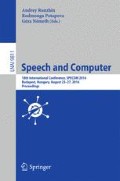Abstract
While human auditory system is predominantly sensitive to the amplitude spectrum of an incoming sound, a number of sound perception studies have shown that the phase spectrum is also perceptually relevant. In case of speech, its relevance can be established through experiments with speech vocoding or parametric speech synthesis, where particular ways of manipulating the phase of voiced excitation (i.e. setting it to zero or random values) can be shown to affect voice quality. In such experiments the phase should be manipulated with as little distortion of the amplitude spectrum as possible, lest the degradation in voice quality perceived through listening tests, caused by the distortion of amplitude spectrum, be incorrectly attributed to the influence of phase. The paper presents an algorithm for phase manipulation of a speech signal, based on inverse filtering, which introduces negligible distortion into the amplitude spectrum, and demonstrates its accuracy on a number of examples.
Access this chapter
Tax calculation will be finalised at checkout
Purchases are for personal use only
Notes
- 1.
A review of most important early studies in phase perception can be found e.g. in [3].
References
Ohm, G.S.: Über die Definition des Tones, nebst daran geknüpfter Theorie der Sirene und ähnlicher tonbildender Vorrichtungen. Annalen der Physik und Chemie 135(8), 513–565 (1843)
von Helmholtz, H.L.F.: Über die Klangfarbe der Vocale. Annalen der Physik und Chemie 18, 280–290 (1859)
Plomp, R., Steeneken, H.J.M.: Effect of phase on the timbre of complex tones. J. Acoust. Soc. Am. 46(2B), 409–421 (1969)
Schroeder, M.R.: Models of hearing. Proc. of the IEEE 63, 1332–1350 (1975)
Oppenheim, A.V., Lim, J.S.: The importance of phase in signals. Proc. IEEE 69, 529–541 (1981)
Patterson, R.D.: A pulse ribbon model of monaural phase perception. J. Acoust. Soc. Am. 82(5), 1560–1586 (1987)
Paliwal, K.K., Alsteris, L.D.: On the usefulness of STFT phase spectrum in human listening tests. Speech Commun. 45(2), 153–170 (2005)
Lim, J.S., Oppenheim, A.V.: Enhancement and bandwidth compression of noisy speech. Proc. IEEE 67, 1586–1604 (1979)
Wang, D.L., Lim, J.S.: The unimportance of phase in speech enhancement. IEEE Trans. Speech Signal Process. 30(4), 679–681 (1982)
Pobloth, H., Kleijn, W.B: On phase perception in speech. In: Proceedings of IEEE International Conference on Acoustics, Speech and Signal Processing (ICASSP), vol. 1, pp. 29–32 (1999)
Shi, G., Shanechi, M.M., Aarabi, P.: On the importance of phase in human speech recognition. IEEE Trans. Audio Speech Lang. Process. 14(5), 1867–1874 (2006)
Schluter, R., Ney, H.: Using phase spectrum information for improved speech recognition performance. In: Proceedings of IEEE International Conference on Acoustics, Speech and Signal Processing (ICASSP), vol. 1, pp. 133–136 (2001)
Raitio, T., Juvela, L., Suni, A., Vainio, M., Alku, P.: Phase perception of the glottal excitation and its relevance in statistical parametric speech synthesis. Speech Communication (in press, 2016)
Sečujski, M., Ostrogonac, S., Suzić, S., Pekar, D.: Speech database production and tagset design aimed at expressive text-to-speech in Serbian. In: Proceedings of Digital Signal and Image Processing (DOGS), Novi Sad, Serbia, pp. 51–54 (2014)
Zen, H., Nose, T., Yamagishi, J., Sako, S., Masuko, T., Black, A.W., Tokuda, K.: The HMM-based speech synthesis system version 2.0. In: Proceedings of ISCA Speech Synthesis Workshop (2007)
Acknowledgments
The presented study was supported in part by the Ministry of Education and Science of the Republic of Serbia (grant TR32035), in part by the project “SP2: SCOPES Project for Speech Prosody” (No. CRSII2-147611/1), financed by the Swiss National Science Foundation, and in part by the company Speech Morphing, Inc. from Campbell, CA, USA, which also provided some of the speech corpora used in the experiments.
Author information
Authors and Affiliations
Corresponding author
Editor information
Editors and Affiliations
Rights and permissions
Copyright information
© 2016 Springer International Publishing Switzerland
About this paper
Cite this paper
Pekar, D., Suzić, S., Mak, R., Friedlander, M., Sečujski, M. (2016). An Algorithm for Phase Manipulation in a Speech Signal. In: Ronzhin, A., Potapova, R., Németh, G. (eds) Speech and Computer. SPECOM 2016. Lecture Notes in Computer Science(), vol 9811. Springer, Cham. https://doi.org/10.1007/978-3-319-43958-7_10
Download citation
DOI: https://doi.org/10.1007/978-3-319-43958-7_10
Published:
Publisher Name: Springer, Cham
Print ISBN: 978-3-319-43957-0
Online ISBN: 978-3-319-43958-7
eBook Packages: Computer ScienceComputer Science (R0)

